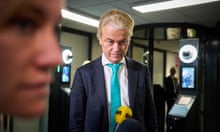Veteran Dutch anti-Islam politician Geert Wilders on Saturday vowed to be prime minister of the Netherlands, after an election in which his party won the most seats.
In a long post on X, formerly Twitter, that expressed frustration at other parties for their apparent unwillingness to cooperate with his Freedom party (PVV), Wilders said he would “continue to moderate” his positions if necessary to gain power.
“Today, tomorrow or the day after, the PVV will be part of government and I will be prime minister of this beautiful country,” Wilders wrote.
Although Wilders’ PVV, which stood on an anti-immigration platform, finished well ahead of rivals in the 22 November vote, his party is forecast to take only 25% of the seats in the Dutch parliament.
That means he will have to cooperate with at least two more moderate parties in order to form a government.
On Friday, the conservative VVD party of caretaker prime minister Mark Rutte, which shares many of Wilders’ views on immigration, said it would not participate in a cabinet with him.
However, the VVD’s new leader, Dilan Yeşilgöz-Zegerius, did not rule out offering a Wilders government outside support.
Pieter Omtzigt, who leads the centrist reform NSC party and is also seen as a likely partner in a Wilders government, has said cooperation will be difficult due to extreme positions he has voiced that appear to violate Dutch constitutional protections on freedom of religion.
Dutch coalition talks usually take months, and positions about parties’ willingness to work with each other can shift as time goes on.
If Wilders is unable to form a government, more centrist combinations that exclude the PVV are theoretically possible, while new elections would be a last resort.










